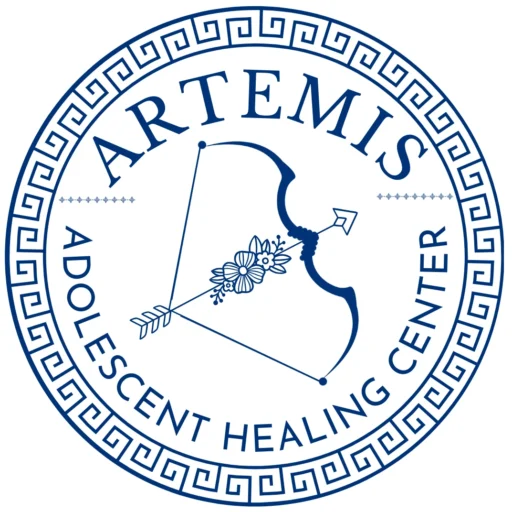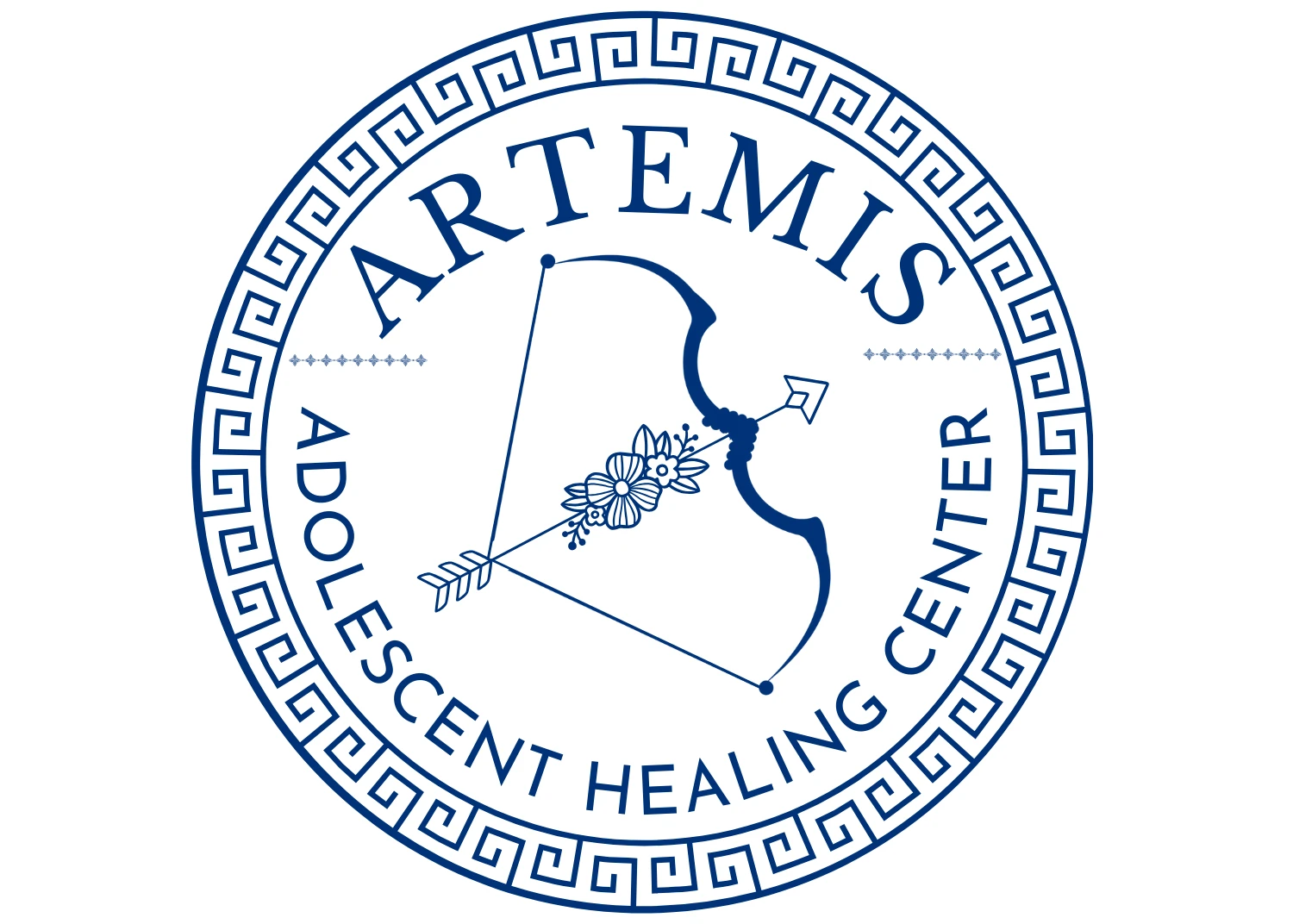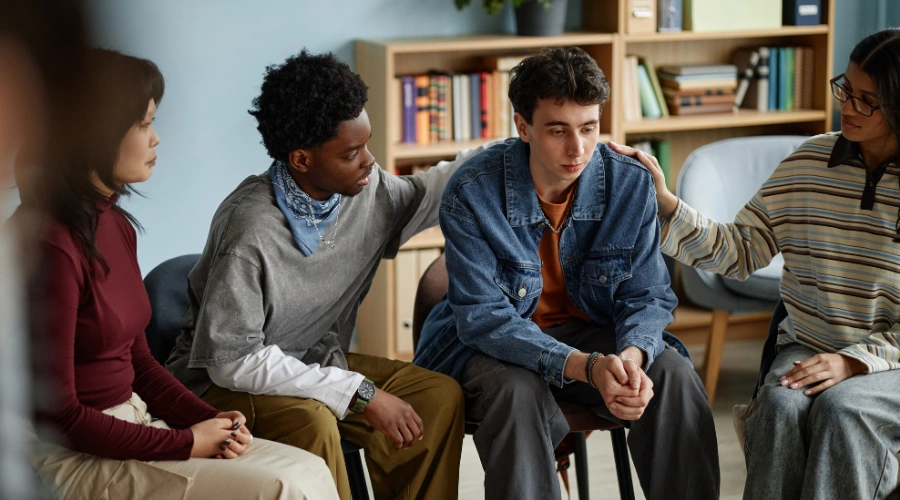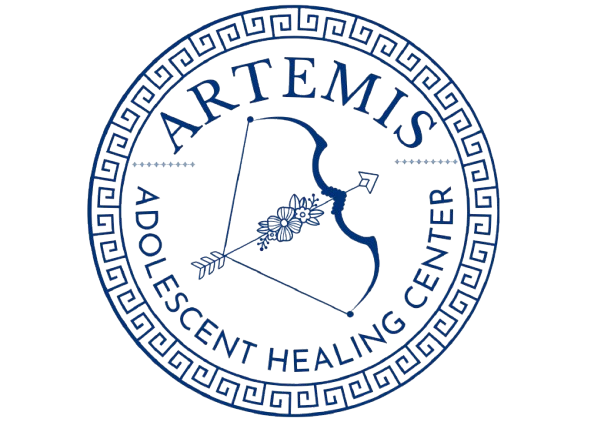Understanding Twelve-Step Programs for Teens and Young Adults
12 Step programs for teens and young adults struggling with substance abuse provide a safe space to share their struggles with understanding peers. Twelve-step meetings also give adolescents accountability while interacting with others who have similar experiences.
These programs are specifically tailored to address the unique challenges a young person faces, such as recognizing and admitting their struggles, and emphasize the importance of peer support and spiritual connection for recovery.
Artemis Adolescent Healing Center recognizes that 12-step programs play a central role in long-term recovery for many young people. They’re especially helpful when integrated with professional treatment programs or as part of a young person’s aftercare program during early recovery. Youth-focused 12-step groups can be found in many communities, and online meetings have increased greatly in recent years.
Almost half of adolescent treatment programs require 12-step involvement to some degree during treatment.
We hope that parents and caregivers find reassurance knowing their teenager has these community resources available as they work together to rebuild the family unit during addiction recovery. Please keep reading to see how recovery meetings and support groups can support long-term recovery.
And remember, our caring team is only a confidential call away if your child needs a firm foundation for success in recovery with the help of our range of support programs at Artemis.
Get Effective Detox and Rehab Options at Artemis
How Teen Support Groups Help with Addiction Recovery
12-Step groups give adolescents a place to learn from adults and other teens who have faced challenges with drug or alcohol abuse.
The National Institute on Drug Abuse (NIDA) notes that 12-step mutual help groups are one of the most widely used recovery support services for both teens and young adults, while also noting that they are led by others who struggle, not by mental health professionals.
Support groups can also be beneficial for families whose finances may be depleted by mental wellness co-pays. The groups are free to attend, though they are grateful for donations or whatever small financial support you might feel comfortable offering.
The 12 Step Philosophy as it Applies to Teenagers
At the heart of every 12-step program is a set of guiding principles designed to help individuals break free from addiction and build a healthier, more fulfilling life.
The 12-step philosophy begins with acknowledging the powerlessness over addiction and recognizing the need for help beyond oneself. For many teens and young adults, this means developing faith in a higher power and making a conscious decision to turn their lives over to that power.
The steps encourage participants to take a searching and fearless personal inventory, admit wrongs, and make amends where possible. This process of self-reflection and spiritual connection fosters personal growth and helps individuals let go of all these defects that may have contributed to their substance abuse.
The sense of community and support found in 12-step groups is especially valuable for young people, providing a safe space to share experiences and learn from others on a similar journey.
Research from the National Institute of Health shows that substance abuse treatment programs incorporating 12-step principles can be highly effective, especially when combined with other forms of support.
We have often seen firsthand from our work with adolescent clients that by embracing these principles, teens can find the strength and guidance needed to overcome addiction and build a brighter future.
Addressing Teen Alcohol and Drug Abuse Through Peer Support
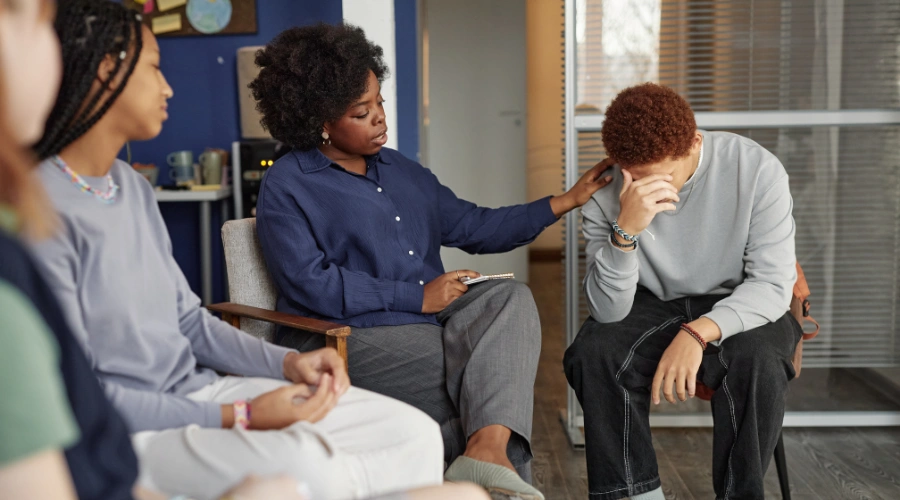
AA and NA are the best-known peer groups, and they address the realities of using or drinking in stark terms. Language like “alcoholism” or “drug addict” seems harsh. The program language, admittedly outdated, implies a certain level of accountability, which encourages the youth who attend meetings to take responsibility for the decisions they’ve made in life.
AA for teens and NA for teens also ask for full sobriety and complete abstinence; they do not allow for half-measures. Twelve-step programs emphasize the importance of sharing recovery narratives during meetings, which helps teens address life’s problems by learning from each other’s experiences.
In meetings, young adults often admit that peers influence their choices. Group discussions can show them how negative friends can encourage drinking or drug use, teaching them to avoid such people and find positive relationships instead.
At Artemis, we complement peer support attendance with weekly discussions and group therapy exercises to help adolescents gain new perspectives on their role in the world.
Alcoholics Anonymous Meetings for Teens Can Shape a Young Person’s Life
AA was the first 12-step program and remains popular today. While it was designed for adults, teens, and young adults are welcome to attend these groups. AA is a widely used treatment option for alcohol addiction among teens. The only requirement for participants is a desire to quit drinking to improve their daily lives and remain abstinent.
They follow the steps, making conscious contact with their Higher Power, having humbly asked them for help. The 12-step philosophy defines recovery as abstinence from alcohol and other drugs (AODs), and includes personality changes and spiritual growth resulting from practicing the 12 steps. By the end of the program, they have a spiritual awakening that empowers them to quit alcohol.
The meetings encourage youth and adults alike to turn to a Higher Power, admit wrong as part of honesty and self-awareness, make direct amends with family members, and stay sober.
You can find a comprehensive list of AA meetings for teens, both in-person and online, on their website.
Narcotics Anonymous for Teens Offers a Resource for Young People

NA is another 12-step group option, specializing in helping teens struggling with other drugs than alcohol. NA meetings for teens follow the same 12-step process. It includes steps like taking a fearless moral inventory, admitting the exact nature of wrongs, and making direct amends to anyone they’ve harmed.
Cocaine Anonymous is another 12-step program available for teens struggling with cocaine abuse, offering peer-led support based on the same 12-step philosophy.
NA is open to teens and young adults struggling with drug use. There are also specialized 12-step groups for individuals with co-occurring disorders, such as Dual Recovery Anonymous, which support those facing both substance use and mental health challenges.
You can find a list of NA meetings on their website. While their in-person meetings are less common than AA, they have a robust network of online meetings.
Adolescents with severe substance use disorders and those with comorbid psychiatric problems participate in 12-step groups at similar or higher levels and experience comparable or better outcomes than their less severely affected counterparts.
Get Accredited Treatment Programs at Artemis
SMART Recovery: Not 12-Step Meetings But Worth a Look
SMART Recovery is another peer support program. The Substance Abuse and Mental Health Services Administration (SAMHSA) recognizes the critical need for recovery groups and points people to SMART meetings as an alternative to AA and NA.
Unlike 12-step meetings, SMART Recovery uses cognitive-behavioral strategies that teach self-management skills and help make better choices. It’s research-driven and practical, recognizing that not everyone has involvement with religion. SMART Recovery is an excellent program for young people who don’t believe in a Higher Power or believe in spiritual connections.
The Connection Between Substance Use and Emotional Health
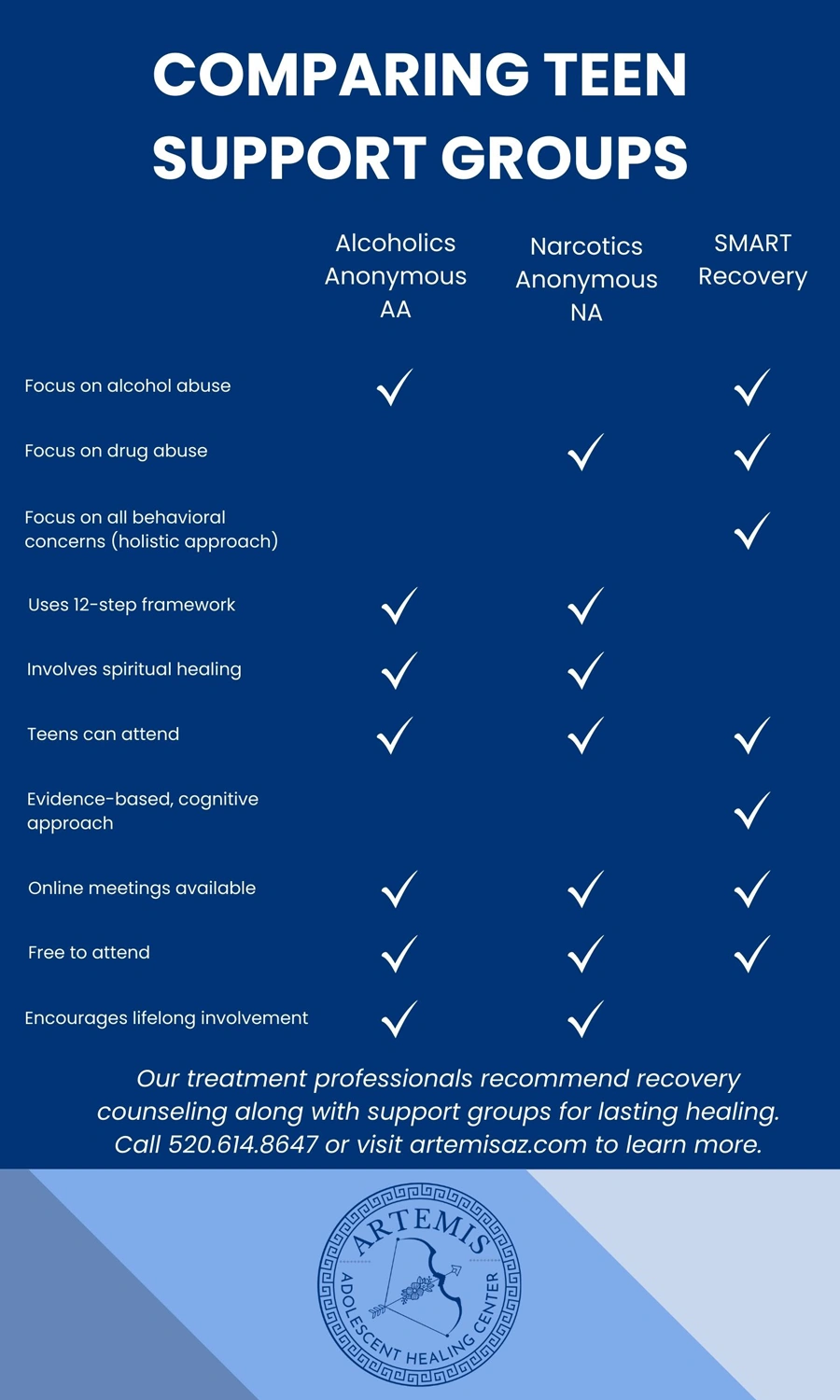
12-Step meetings do more than discuss quitting alcohol or drugs. They also help adolescents understand how addiction can impact their emotional and mental well-being.
These programs encourage teens to develop faith (or some form of spirituality) as part of their recovery process, supporting personal spiritual growth and belief in a higher power.
Groups often discuss how drugs or alcohol have become a coping mechanism for anxiety, fear, trauma, or low self-esteem. The process of discussing these topics with peers helps teens connect their addiction to their inner selves. In this sense, spiritual growth is a focus of 12-step programs, helping teens develop emotional resilience and a new sense of purpose.
Why Mental Health Care Matters Alongside 12-Step Programs
Support groups can be powerful. At Artemis, we believe that they are best as an enhancement to professional treatment. In our experience, teenagers and young adults receive the most benefit by attending both 12-step groups and professional recovery services.
Greater participation in 12-step programs, through frequent and active engagement, leads to better outcomes for teens, including sustained abstinence and improved social support.
Our programs teach teens to self-reflect, restore relationships with parents or siblings, and practice coping tools to help stay sober. They participate in individual and family therapy, along with peer support groups that help prepare them for AA or NA meetings in early recovery.
Active involvement in 12-step programs, such as working the steps with a sponsor, predicts sustained remission better than attendance alone.
Professional treatment programs offer teens a higher level of support than participation in community support groups alone, equipping them with all the tools they need for a sober life. Sponsorship encourages teens to find someone with more experience in the program for mentorship, guidance, and accountability.
Family therapy or support groups like Al-Anon are often required to address household dynamics in teen recovery.
Insurance Covers the Cost of Seeking Professional Treatment

Substance use disorders are considered mental illnesses, which are covered by group and private health insurers. If you are a concerned parent and want to know how much your insurance will pay for our professional recovery support services, please call our admissions team.
We will gladly conduct a free, confidential review of your insurance benefits and coordinate your services with your insurer.
Up To 100% of Rehab Costs Covered By Insurance
Get Professional Help for Teen Substance Use Disorders at Artemis
If your teen has withdrawn from family and friends and spiralled into addiction, recovery is possible.
Our team will treat the alcohol and substance use, along with any co-occurring mental disorders that may have caused them to start relying on harmful substances to begin with.
If you and your teen are ready for a sober future, the Artemis Adolescent Healing Center team is here to help. Call us confidentially today to learn more and get proven options for your child today.
FAQs on 12 Step Programs for Teens and Adolescents
How can I support my teen if they are hesitant to join a 12 step program?
It’s common for teens to resist admitting they have a problem or to feel uncomfortable with the idea of a higher power. You can support your teen by encouraging open conversations, helping them find youth-focused or peer-led groups where they feel safe, and reminding them that recovery is a personal journey. Connecting them with a sponsor or mentor who understands their experience can also make a big difference.
Are 12 step programs effective for teens compared to adults?
While the 12 step philosophy was originally designed for adults, many teens benefit greatly from participation, especially when programs are tailored to their developmental stage. Teens who actively engage in 12 step meetings and work the steps with peer support often experience more abstinent days and improved mental health outcomes than those who do not attend.
What makes teen 12 step groups different from adult groups?
Teen 12 step groups often emphasize peer support, activities, and discussions that relate specifically to adolescent challenges. These groups provide a safe environment where young people can share experiences with peers who understand their unique struggles, making it easier to relate and stay engaged in recovery.
Can 12 step programs help if my teen has co-occurring mental health issues?
Yes, many 12 step programs recognize the importance of addressing both substance use and mental health challenges. Specialized groups like Dual Recovery Anonymous support individuals with co-occurring disorders, and combining 12 step participation with professional mental health care can lead to better outcomes.
How do I find a 12 step program that’s right for my teen?
Many communities offer youth-focused 12 step meetings, and there are also numerous online options. You can visit official websites for Alcoholics Anonymous (AA) and Narcotics Anonymous (NA) to find local or virtual teen meetings. It’s helpful to explore different groups to find one where your teen feels comfortable and supported.
Works Cited
- National Institute on Drug Abuse. (n.d.). Treatment approaches for drug addiction. Retrieved June 2024, from https://nida.nih.gov/research-topics/treatment
- National Institute on Drug Abuse. (n.d.). Teen substance abuse treatment: Alcohol abuse. Retrieved June 2024, from https://artemisaz.com/teen-substance-abuse-treatment/alcohol-abuse/
- Narcotics Anonymous. (n.d.). Meeting search. Retrieved June 2024, from https://na.org/meetingsearch/
- Substance Abuse and Mental Health Services Administration. (n.d.). Find support: Health care or support group or local program. Retrieved June 2024, from https://www.samhsa.gov/find-support/health-care-or-support/support-group-or-local-program
- SMART Recovery. (n.d.). Meetings. Retrieved June 2024, from https://smartrecovery.org/meeting
- U.S. National Library of Medicine. (2019). Adolescents and the 12-step programs: A review. Substance Abuse Treatment, Prevention, and Policy, 14(1), Article 43. https://www.ncbi.nlm.nih.gov/pmc/articles/PMC6997953/
